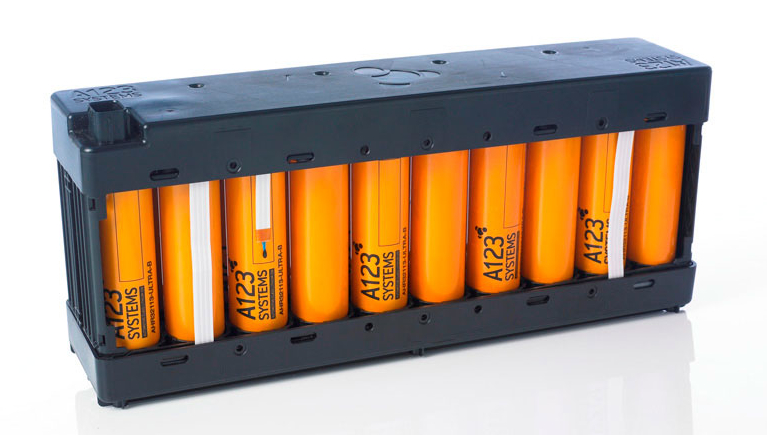Japan, S. Korea dominate electric car and hybrid battery market

[caption id="attachment_13162" align="alignnone" width="620" caption="U.S. lithium ion battery maker A123 Systems is among the 'contenders' in Pike's report. Above, an A123 battery in a passenger vehicle (image from A123)."]
 [/caption]
[/caption]
Lithium ion batteries are leading the charge in the electric vehicle market, and no countries produce them better than Japan and South Korea.
That's according to Pike Research, which ranks South Korea's LG Chem as the leading vendor in a new report, Electric Vehicle Batteries - Assessment of Strategy and Execution for 10 Leading Lithium Ion Batteries. American company Johnson Controls bucks the Japan/S. Korea trend by grabbing the number two spot, followed by Japan's AESC.
"The Li-ion automotive market is currently led by Japanese and Korean companies that originally produced cells for the consumer electronics and computing markets," Pike states. "These veteran companies are being challenged by companies mostly from China and North America that are slowly gaining customers, mostly in their domestic markets."
Pike says its evaluation combines both strategy and execution, "including vision, go-to-market strategy, partners, product strategy and roadmap, geographic reach, market share, sales and marketing, product quality ad reliability, product portfolio, and staying power."

Pike singles out LG Chem as the "leader," noting it "has a diversified customer base of interntional automotive OEMs that are expected to be among the most successful sellers of hybrids and plug-in vehicles."
It categorizes Johnson Controls, GS Yuasa, AESC, A123 Systems, Panasonic and SB LiMotive as "contenders," noting that all have "established relationships with the top selling global OEMs and could quickly rise."
"Challengers" Hitachi Vehicle Energy, BYD and Electrovaya "face greater obstacles, as they are not viewed by the industry as being in the elite field of EV batter companies," according to the report. "They also do not currently have the manufacturing capacity in place to produce the volumes necessary to become a global leader."
Overall, Pike says the market will grow 450 percent by 2017, to 28 million kilowatt hours (which would put today's market at 6.2 million kWh), as sales of electric and hybrid vehicles grows to millions of vehicles per year. Purely electric vehicles will account for 74 percent of the 28 million kWh, plug-in electric hybrids for 22 percent, and non-plug in electric hybrids for 4 percent.
PIke also expects to see an industry shakeout. "The Li-on market is entering a mature phase that will see some smaller companies fail or be acquired due to an inability to reach volume production," the Boulder, Colo.-based research firm states. "The market will likely see volatility during 2012 as some supplier agreements change hands."
Indeed, some vendors have struggled as the market for batteries in EVs and hybrids has yet to boom. Pike's number two, Johnson Controls, has scaled back production, and contender A123 lost to Asian rivals for contracts at major car makers including General Motors. Last month, New York City-based vendor Ener1 filed for bankruptcy protection.
The market is also ripe for innovation. Earlier this week, U.K. defense firm BAE Systems showed a technology that allows a car's carbon fiber body to double as a battery.
Despite Pike's statement noting that South Korean companies are outpacing U.S. firms, its Top 10 list includes two companies from both countries, albeit with S. Korea's LG Chem at the top:
- LG Chem, South Korea (leader)
- Johnson Controls, U.S. (contender)
- GS Yuasa, Japan (contender)
- Automotive Energy Supply Corp. (AESC), Japan (contender)
- A123 Systems, U.S. (contender)
- Panasonic, Japan (contender)
- SB LiMotive, South Korean/German JV (Samsung/Bosch), HQ in South Korea (contender)
- Hitachi Vehicle Energy, Japan (challenger)
- Build Your Dreams (BYD), China, 10% owned by Warren Buffet's Berskhire Hathaway (challenger)
- Electrovaya, Canada (challenger)
Plug into more EV and battery stories on SmartPlanet:
- BAE turns LeMans race car's carbon fiber body into battery
- Battery maker Ener1 files for bankruptcy
- U.S. battery startups face strong headwinds
- Chinese consumers preferred EVs to hybrids by 2-1 in 2011
- No EVs please, we're British
- China turning its back on EVs
Related video on SmartPlanet:
[video=6332292]
This post was originally published on Smartplanet.com